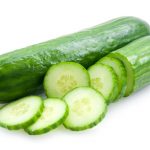 If you were to eat a two-pound cucumber, you would ingest only an ounce of actual “cuke” material; the rest of it—96%, in fact—would be water. The name of this moist fruit derives from the Greek kukuon, which evolved into the Latin cucumis. Accordingly, when English adopted this Latin word in the late fourteenth century, it was spelt cucumer, that is, without a b; it retained this form until the fifteenth century when the influence of the French name, coucombre, caused the English spelling to change to cucumber. Later on, in the sixteenth century, the French coucombre again affected the English word, causing the first syllable to change so that the word was spelt and pronounced cow-cumber. The appearance of the term horseradish at about the same time may also have partly inspired the cow-cumber spelling, even though the notion of a cow having cumber must have seemed absurd (at that time, the word cumber, now obsolete, meant embarrassment). Cow-cumber remained the standard spelling and pronunciation of the word until the early nineteenth century, when it became associated with the uneducated masses who grew them; as a result, snooty scholars restored the cucumber spelling and pronunciation to make the word look more like its original Latin form, although by the same reasoning the b should have been removed as well, but was not. The phrase cool as a cucumber is surprisingly old—its first recorded use is in 1732 in a poem by John Gay: “I, cool as a cucumber, could see the rest of womankind.” The abbreviated name of the fruit, cuke, dates back to the beginning of the twentieth century.
If you were to eat a two-pound cucumber, you would ingest only an ounce of actual “cuke” material; the rest of it—96%, in fact—would be water. The name of this moist fruit derives from the Greek kukuon, which evolved into the Latin cucumis. Accordingly, when English adopted this Latin word in the late fourteenth century, it was spelt cucumer, that is, without a b; it retained this form until the fifteenth century when the influence of the French name, coucombre, caused the English spelling to change to cucumber. Later on, in the sixteenth century, the French coucombre again affected the English word, causing the first syllable to change so that the word was spelt and pronounced cow-cumber. The appearance of the term horseradish at about the same time may also have partly inspired the cow-cumber spelling, even though the notion of a cow having cumber must have seemed absurd (at that time, the word cumber, now obsolete, meant embarrassment). Cow-cumber remained the standard spelling and pronunciation of the word until the early nineteenth century, when it became associated with the uneducated masses who grew them; as a result, snooty scholars restored the cucumber spelling and pronunciation to make the word look more like its original Latin form, although by the same reasoning the b should have been removed as well, but was not. The phrase cool as a cucumber is surprisingly old—its first recorded use is in 1732 in a poem by John Gay: “I, cool as a cucumber, could see the rest of womankind.” The abbreviated name of the fruit, cuke, dates back to the beginning of the twentieth century.
A plump and succulent fruit hailing from the gourd family, originating in northern India. Cucumbers are consumed raw, sliced into thin pieces and served as a salad component, or as an accompaniment to cold dishes, fish entrees, and more; they also serve as a visually appealing garnish. These fruits can be cooked in various ways and have a unique yet subtle taste. Braising, stuffing, or using them in soups are popular methods of preparing cucumbers. Petite cucumber types, referred to as gherkins or Kirbys, are frequently pickled. When selecting cucumbers, opt for those with a smooth and firm exterior. Commercial cucumbers necessitate peeling prior to usage, as their skin is coated with wax.
